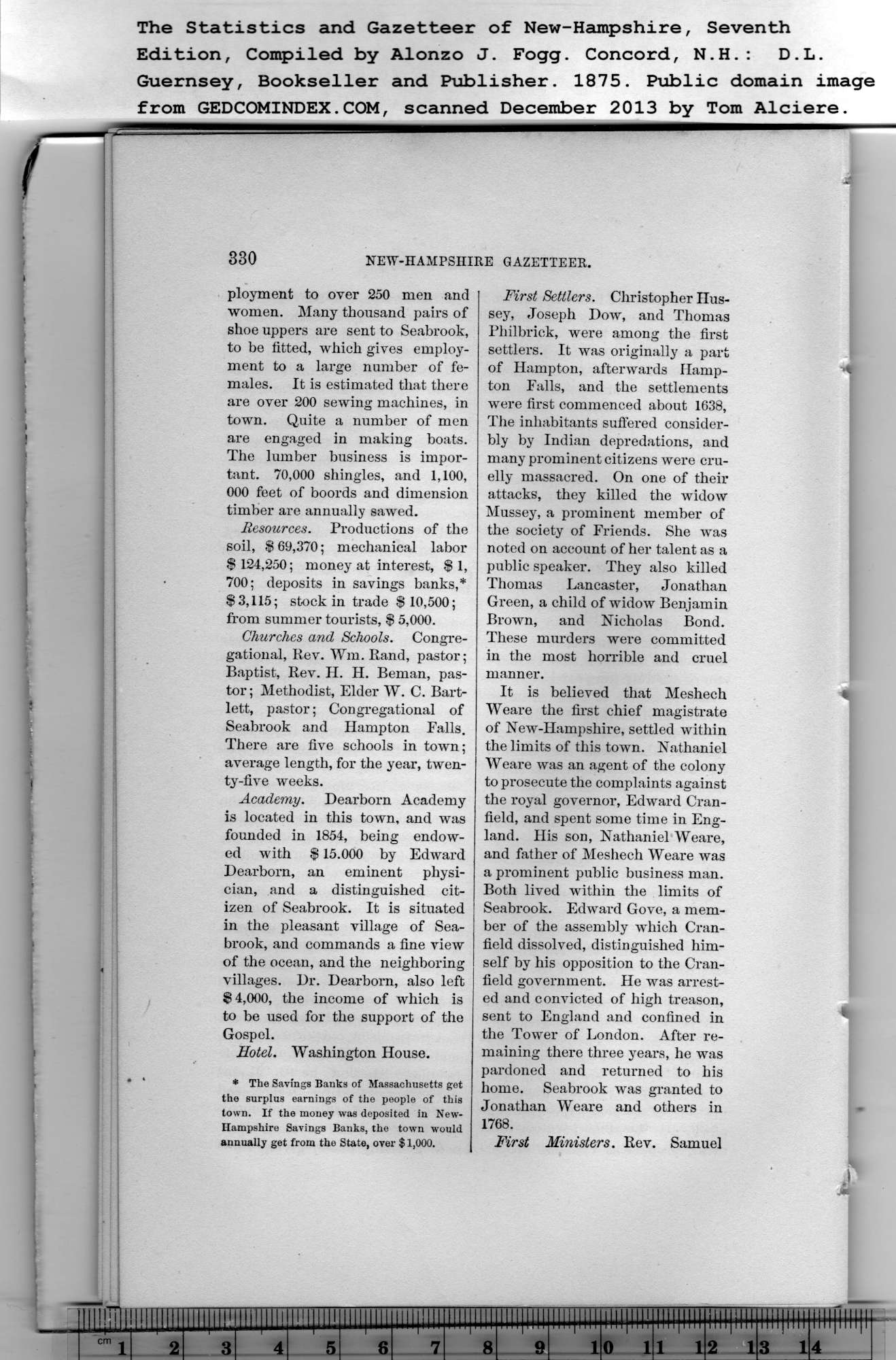|
330
The Statistics and Gazetteer of New-Hampshire, Seventh
Edition, Compiled by Alonzo J. Fogg. Concord, N.H.: D.L.
ployment to over 250 men and
women. Many thousand pairs of
shoe uppers are sent to Seabrook,
to be fitted, which gives employ-
ment to a large number of fe-
males. It is estimated that there
are over 200 sewing machines, in
town. Quite a number of men
are engaged in making boats.
The lumber business is impor-
tant. 70,000 shingles, and 1,100,
000 feet of boords and dimension
timber are annually sawed.
Resources. Productions of the
soil, $ 69,370; mechanical labor
$ 124,250; money at interest, $ 1,
700; deposits in savings banks,1
$3,115; stock in trade $ 10,500;
from summer tourists, $ 5,000.
Churches and Schools. Congre-
gational, Rev. Wm. Rand, pastor;
Baptist, Rev. H. H. Beman, pas-
tor ; Methodist, Elder W. C. Bart-
lett, pastor; Congregational of
Seabrook and Hampton Falls.
There are five schools in town;
average length, for the year, twen-
ty-five weeks.
Academy. Dearborn Academy
is located in this town, and was
founded in 1854, being endow-
ed with $ 15.000 by Edward
Dearborn, an eminent physi-
cian, and a distinguished cit-
izen of Seabrook. It is situated
in the pleasant village of Sea-
brook, and commands a fine view
of the ocean, and the neighboring
villages. Dr. Dearborn, also left
$4,000, the income of which is
to be used for the support of the
Gospel.
Hotel. Washington House. |
First Settlers. Christopher Hus-
sey, Joseph Dow, and Thomas
Pliilbrick, were among the first
settlers. It was originally a part
of Hampton, afterwards Hamp-
ton Falls, and the settlements
were first commenced about 1638,
The inhabitants suffered consider-
bly by Indian depredations, and
many prominent citizens were cru-
elly massacred. On one of their
attacks, they killed the widow
Mussey, a prominent member of
the society of Friends. She was
noted on account of her talent as a
public speaker. They also killed
Thomas Lancaster, Jonathan
Green, a child of widow Benjamin
Brown, and Nicholas Bond.
These murders were committed
in the most horrible and cruel
manner.
It is believed that Meshech
Weare the first chief magistrate
of New-Hampshire, settled within
the limits of this town. Nathaniel
Weare was an agent of the colony
to prosecute the complaints against
the royal governor, Edward Cran-
field, and spent some time in Eng-
land. His son, Nathaniel Weare,
and father of Meshech Weare was
a prominent public business man.
Both lived within the limits of
Seabrook. Edward Gove, a mem-
ber of the assembly which Cran-
field dissolved, distinguished him-
self by his opposition to the Cran-
field government. He was arrest-
ed and convicted of high treason,
sent to England and confined in
the Tower of London. After re-
maining there three years, he was
pardoned and returned to his
home. Seabrook was granted to
Jonathan Weare and others in
1768.
First Ministers. Rev. Samuel |
